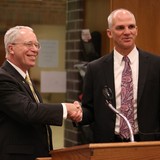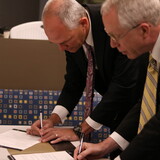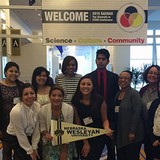Missy Franklin. Gabby Douglas. Misty May-Treanor and Kerri Walsh Jennings. Sonya Richards Ross. The U.S. women’s basketball team, soccer team, and water polo team.
The 2012 summer Olympics will long be remembered for many reasons, but perhaps the most memorable part of the games was the success of its women athletes.
Little could anyone have imagined when Title IX passed in 1972 that 40 years later women would outnumber men on the U.S. Olympic team. The legislation opened the door for women’s team and individual sports.
But one doesn’t have to look to the world’s most prestigious athletic stage to find proof that Title IX has provided opportunity to today’s female athletes.
“Nebraska Wesleyan has made huge strides in making our facilities equitable, our travel, practices, coaching and entire athletic experience equitable,” said NWU Assistant Athletic Director Jo Bunstock.
“I can remember when our women’s teams were more like intramural teams. We crossed our fingers and hoped people would show up,” she continued. “It’s completely different today.”
Bunstock and 17 members of Nebraska Wesleyan’s basketball team and their coaches boarded a plane on August 15 and flew to Estonia — a first for a NWU female athletic team. While in Estonia the Prairie Wolves will play three games against club teams including two teams from Tallinn and one from the University of Tartu.
“I’m looking forward to experiencing a new culture,” said senior Mallory Shanahan, a biology major from Wahoo, Neb. “You don’t get this kind of experience everyday.”
In 2008, Nebraska Wesleyan established a direct exchange relationship with the University of Tartu, Estonia’s premier institution. NWU students study there each semester as part of the sister school agreement. Last summer the University Choir traveled there for an international tour to Tartu and Tallinn where they performed for large audiences. NWU history professor Megan Winchell is returning to campus this fall after teaching at the University of Tartu for a year thanks to a Fulbright Scholarship.
The women's basketball team's trip has been made possible by The Harry & Reba Huge Foundation, which provides scholarship and exchange opportunities to student scholars. The Foundation also funded the men's basketball team trip last year.
For most members of the women’s basketball team it will be the first time they’ve traveled abroad. In addition to their competitions, the team will embrace the culture, learning archery, going horseback riding, visiting the U.S. Embassy, and taking a day trip to Helsinki, Finland.
The team started workouts and drills in early August to prepare them for their upcoming games. They also participated in team bonding activities. They went rock climbing; they painted their locker room; they volunteered at nearby Dawes Middle School. Their coach, Eric Jensen, gave them assigned reading — the book “My Estonia” by Justin Petrone.
It’s an experience they know they won’t take for granted.
“I love to travel,” said first-year student Alyssa Stanek. “No one can ever take that experience and those memories away from you.”
Experiences that weren’t attainable over 40 years ago.
“I think in some ways we take women’s sports for granted,” said Bunstock. “Women’s sports have erupted in numbers and in caliber. The women come in more prepared.”
NCAA allows schools to take team trips overseas every three years. Last season the Nebraska Wesleyan men’s basketball team traveled to Estonia.
The women’s team will return August 25 with just one day of rest before starting their fall semester.
“Part of the deal when the men went last year was that the women would go too,” said Bunstock. “Nebraska Wesleyan provides these kinds of experiences to both teams because it’s the right thing to do but I think Title IX gave it the boost.”
Upon their return, players expect a more cohesive team.
“When the men’s team returned, their team chemistry extended beyond the court,” said Bunstock. “You could see the impact that trip had on them in the way they interacted in the hallways with each other, their coaches and their professors.
“I think the women’s team will be the same way,” Bunstock continued. “They will have a better appreciation for what they have, who they are, and where they want to go.”











